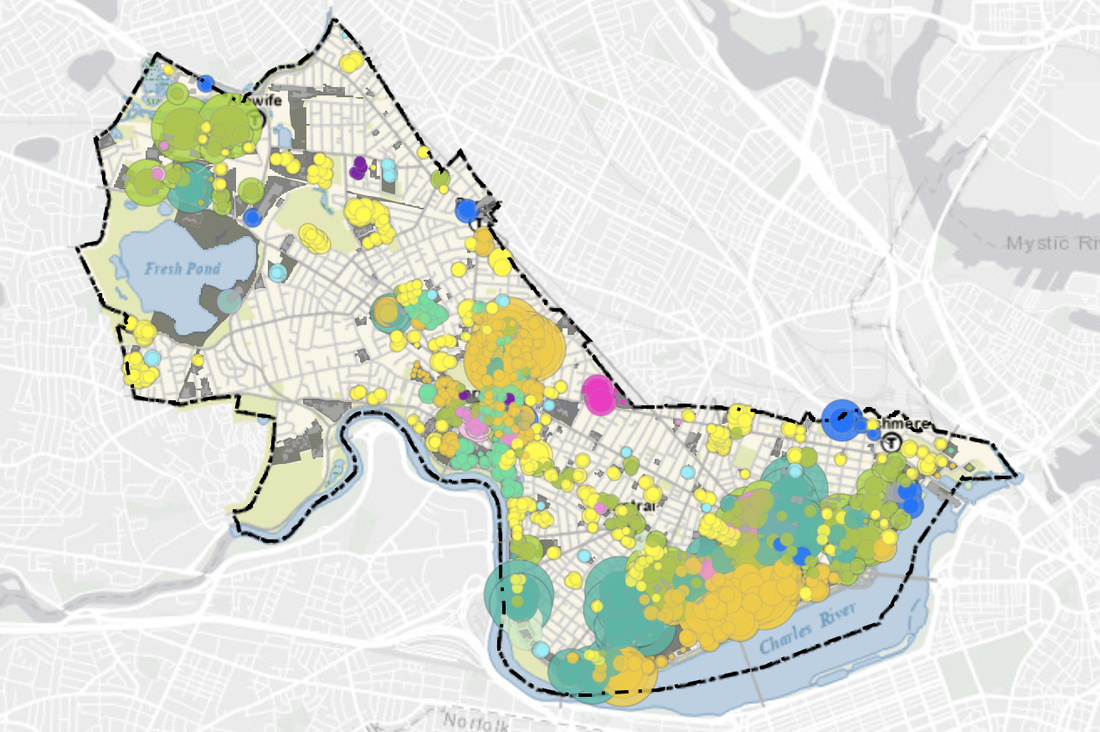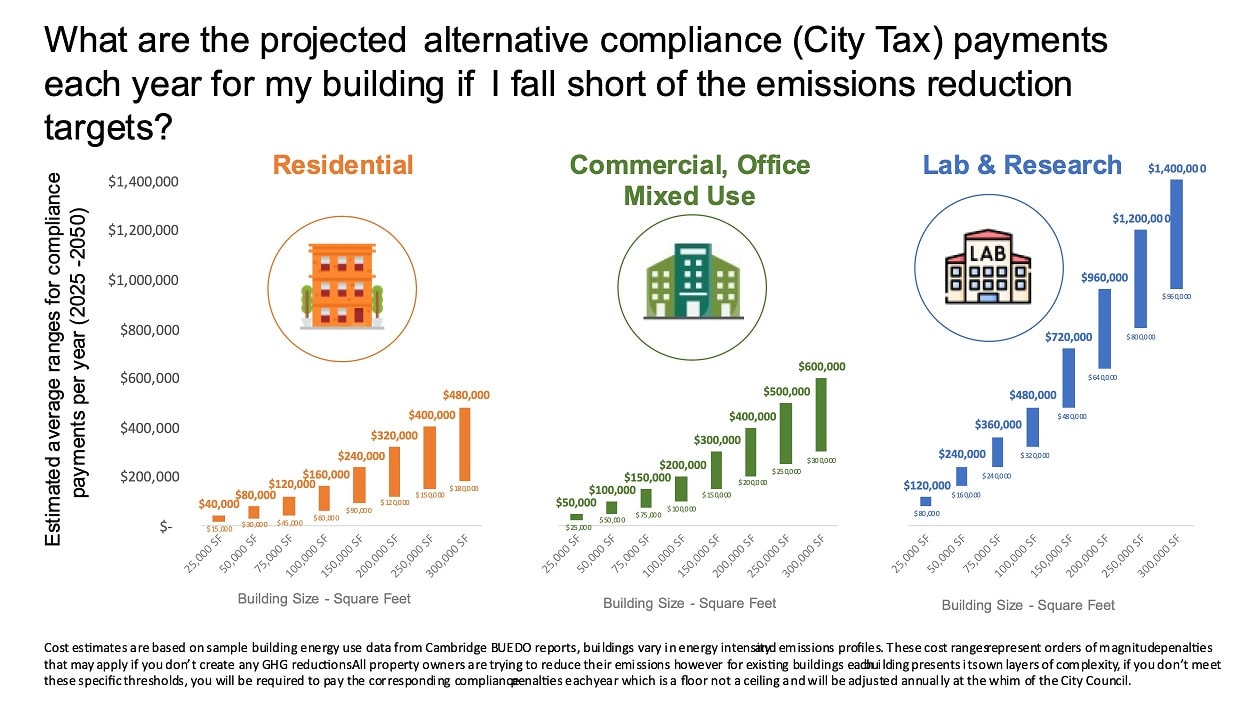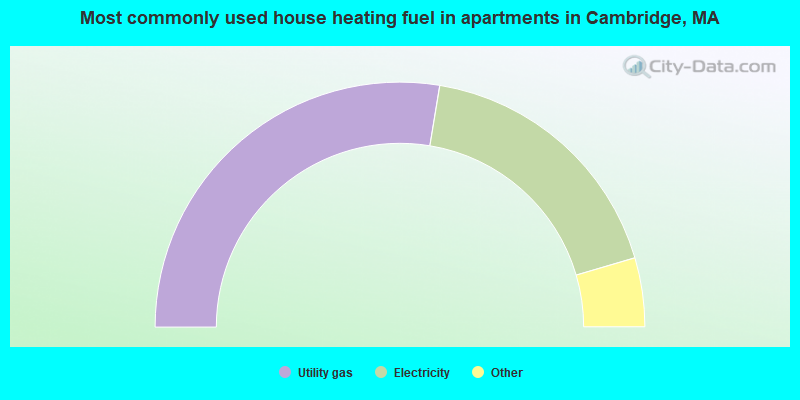|
BEUDO energy performance map - 2019 data This post has been updated to reflect the current situation. What every Cambridge resident and small business owner needs to be following now! State regulations require buildings to convert from gas to electrical by 2050. See BEUDO (The Building Energy Use Disclosure Ordinance). A majority on Cambridge City Council want this conversion to happen more quickly and are pushing for a 2035 net zero date, a decade and a half earlier than Boston. While important in an ideal world, there are unintended consequences that will drive up housing costs – dramatically and other unintended consequences which is why important counter voices are being heard on this move by small businesses, commercial property owners, residential property owners, condo owners, and renters alike. .What is proposed: to require escalated retrofitting by 2035 of all a residential properties with 50 or more units as well as large commercial properties. Condo owners in Cambridge banded together to stave off this fast-clipped change because of the complex issues involved with different condo owners. CCC also successfully pushed to exclude rental properties from this early move. As one condo board member noted for a 58-unit 1909 building “each unit in my building will owe $170,352 apiece. I’d pretty much want to know what the City would do with the $10,000,000 from our building alone." These costs also would be passed on to local renters - as well as owners if they are living in their own units. During the time when these buildings are upgraded, many residents also will be required to find housing elsewhere. This is important to have in place for new buildings, but This shortened period to prepare is likely to extensively hit lower- and middle-income residents, and those on fixed income. Many will have to leave the city. Significantly, one factor being cited is that BEUDO is “not just about disclosure, mandates as taxation; Linkage as revenue generator w/o regard to incentives and unintended consequences.” Ironically the new electric sources and capabilities for this transition are not even available yet, and were we to wait until the state mandates of 2050 likely new technologies (eclipsing those available now) will make the transition far easier and far less expensive. Key questions remain, for examples whether programs like the Cambridge Community Electricity Program, for 100 percent green energy, has enough available green energy – and at what cost. Ironically too, in Cambridge BY FAR the worst offenders (the greatest energy users) are our labs who use a vast majority of this energy resources. Commercial users (especially labs) need to be addressed first and let residential units wait for the 2050 mandate. Focusing on large labs for an earlier date of compliance makes more sense considering how important current housing needs and pricing are for city residents today. Alas most Cambridge residents have not even heard of this move for existing properties. Another problem at hand, is that each building owners will have to decide on their own how to rush through this change – in some cases it means that people will loose living spaces/porches as individual units are added. Here is the list of "stakeholders" that the city chose to worked with on this: Abcam; AHA Engineers; Akelius Residential; Alexandria; Atrius Health; Avalon Bay; Biomed Realty; Boston Properties; BrightPower; BR+A; Cambridge Brands; Cambridge Housing Authority; Cambridge Innovation Center; Cambridge Redevelopment Authority; Cambridge Savings Bank; CBRE; City of Boston; Code Green Solutions; Equity Residential; Eversource; Google; Jacobs; Jones Lang Lasalle; Just a Start; Harvard COOP; Harvard University; Homeowners Rehab, Inc; Laverty Lohnes Properties; Leeder Management; Lincoln Property Company; MAPC; Marriott; MassDevelopment; MIT; MITIMCO; New Ecology; Novartis; Partners Healthcare; Upland Capital. A new effort called Electrify Cambridge has been introduced for residents. This program seeks to help Cambridge renters and homeowners with this process. One can sign up for the Electrify Cambridge Launch Webinar to learn about the program and get questions answered on your specific costs, or you can call the Cambridge Energy Helpline at 617-430-6230 and sign-up for a free consultation. But there remain a number of challenges. A July 9, 2023 Boston Globe article titled “Cambridge rule targets emissions” lays out some of these issues. According to one Cambridge opponent, Denise Jillson of the Harvard Square Business Association: Some of these BEUDO amendments “are unworkable” and “penalize business owners, property owners and residents for not being able to achieve the unachievable by imposing financial burdens that are unfair and unjust.” In addition to costs, another is whether the electricity exists to make these required transformations possible. Still another is the available work force. A July 20,2023 article in the Boston Globe “Does Mass. Have the Workers to Build a Green Economy? notes that it will take 38,100 workers to help Massachusetts transition to clean energy state according to a report by the Massachusetts Clean Energy Center (MassCEC), a quasi-public agency that supports the state’s green energy industry. The document forecasts thousands of new jobs by 2030 in order to meet the state’s decarbonization goals. And, according to the center’s analysis, Massachusetts needs its clean energy workforce to expand by 37% from the current size of 104,000 yet there remain sizable challenges to filling those positions. For example, 88 percent of companies that responded to MassCEC surveys said they have difficulty hiring workers for clean energy jobs despite the fact that “there are places where we need immediate intervention.” Moreover “Massachusetts’ clean energy workforce has grown little since 2017.” The report states that the pandemic ended up “…wiping out one in every six clean energy jobs (about 12,800). Almost half of those jobs had returned by 2022” but the states “overall labor force is shrinking…. Workers might transition from fossil fuel industries, but jobs there are estimated to fall…3 percent by 2030….Training capacity, too, is a hurdle [and]….many occupations at severe risk of facing worker shortages are also those that require extensive training, which takes time.” Another problem is the technology since “many jobs – like cost estimators and insulation workers – have changed a lot with technology, and that change is only accelerating…..Think about how rapidly technology is changing…[t]hat means these jobs are changing just as fast.” And there is the issue of diversity. Women comprise “…only 31% of this clean energy workforce, far fewer in many specialized occupations, like electricians, 98% of whom are male.” And “only 7 percent of the state’s clean energy construction workers and 11 percent of electric power line installers are Black. This is a problem for environmental justice…” The question of the city’s new gas-linkage fees are also being raised by some informed residents because the language of this particular ordinance does not comply with the city’s current zoning definitions. At present it appears that homeowners and small business building owners who add a large enough addition to comprise ½ or more their existing structure, may face very high linkage fees that apparently were not intended in the Council’s original vote. One Cambridge Councillor has urged a citywide move to geo-thermal heat pumps, but Germany has had problems with the strategy to require Heat Pumps (“Boilergeddon”) HERE Another ramification is on new design requirements. Many new buildings must now include inoperable windows (a risk in this era of COVID and electricity outages) and a call by some that windows be removed from historical preservation criteria. This change will impact renters in the city as much as property owners. Yes, it is important that we address climate change. But let’s insist that the city focus on what really matters (policies stated in the article at the top of the letter) and labs who use much of our current energy. We could also require that new water heaters installed in the city be electric rather than gas. Let’s also be far more transparent about the proposed changes and their likely impacts on current residents.
0 Comments
Your comment will be posted after it is approved.
Leave a Reply. |


